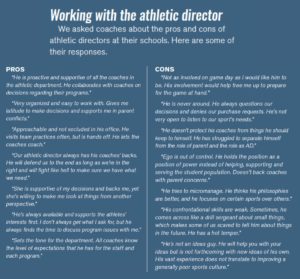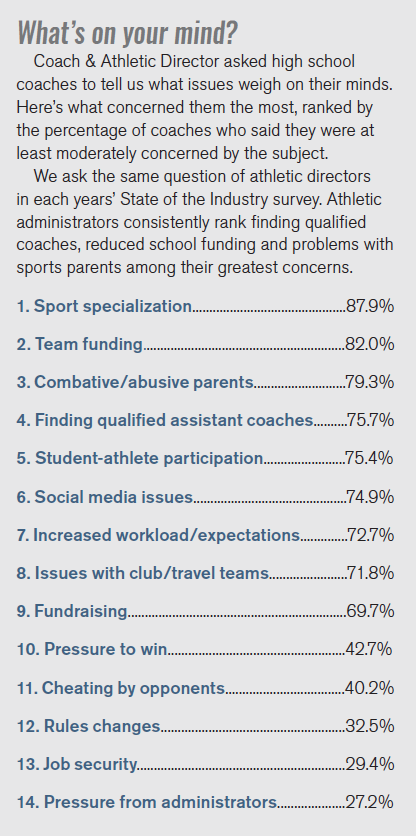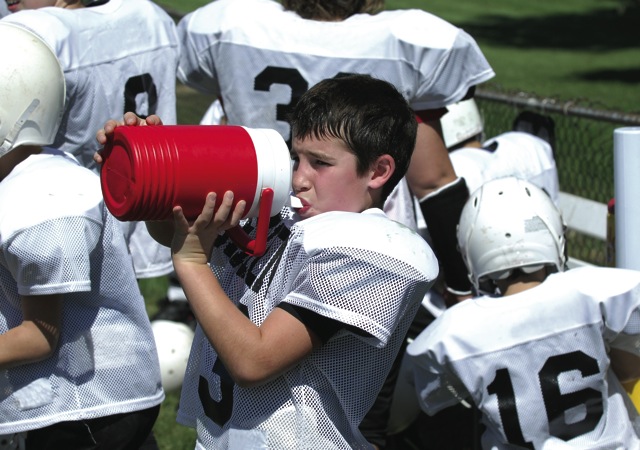2018 Coaches Report: Relationships with supervisors
 For seven years, Coach & Athletic Director has published a report examining high school sports through the eyes of the athletic director. The success of our annual State of the Industry survey, and the insight it has provided athletic administrators nationwide, encouraged us to begin the same analysis with sport coaches.
For seven years, Coach & Athletic Director has published a report examining high school sports through the eyes of the athletic director. The success of our annual State of the Industry survey, and the insight it has provided athletic administrators nationwide, encouraged us to begin the same analysis with sport coaches.
Our inaugural Coaches Report explores a handful of the biggest issues in team sports — coach-parent relationships, sport specialization, club and travel leagues, administrative support. As with our athletic director survey, our goal is to identify the greatest challenges and opportunities in the coaching profession. This helps shape Coach & Athletic Director’s content and provides valuable insight for coaches everywhere.
This year’s survey of 488 coaches confirmed some suspicions and offered a few surprises (see results below). Nearly all coaches oppose single-sport participation, and most of them openly encourage their athletes to take up other sports. And while combative parents continue to be a headache for coaches everywhere, an overwhelming majority said they have a healthy relationship with moms and dads.Here’s a closer look at some of our findings.
Relationships with supervisors

Coaches maintain healthy relationships with their athletic directors, but principals and superintendents can be a different story. We polled coaches on their interactions with supervisors, and 87 percent said they had a good relationship with their athletic administrator. That number decreased with principals (81 percent) and superintendents (69.7 percent).
Coaches sometimes leave their jobs because of a strained relationship with their supervisors, so we asked what they liked most and least about their athletic directors. Most enjoyed the AD’s support — especially in the face of criticism from outside the school — but complained that some exhaust too much time in micromanaging each coach’s program.
Less than 9 percent of coaches feel pressure from their athletic administrator to win more games. Most said their ADs had a greater agenda.
“My school district is more concerned that the coaches provide a quality experience for our athletes with an emphasis on sportsmanship and competing the proper way,” said one coach.
“Our kids work hard in the classroom, are good examples for the school and serve in the community,” said another coach. “That goes a long way.”
Staying happy on the job
Athletic directors tell us that maintaining quality coaches is one the biggest challenges in their jobs. We responded by asking coaches what they consider to biggest factor to keeping them happy at their current schools. Here are some of their responses.
“It would be extremely helpful if the school spent as much time professionally developing their coaches as they do their teachers.”
“Keep the parents at bay. Make sure they understand the value their kids are learning, and that no one, including the kids, have fun when it’s all about winning.”
“I feel that they should find ways to support our coaches and at least try to find ways to assist us with our budget concerns. We get chewed for little things and our workload keeps increasing, but our stipends have been the same for 30-plus years.”
“Be involved, care about kids and know what’s going on in all programs. Celebrate successes, and don’t just bring in more rules and directives.”
“Being able to teach sport and life lessons to players while being supported by the administration. I’m an assistant at another school, and that school has great administrative support. The AD stops by practice frequently and parent issues are handled with little pressure on the coaches. Coaches there stay a long time and the overall success is better.”
“Retention is predicated on a good working environment. That means suitable pay and support from the administration and teachers.”
“I am paid almost nothing to coach year-round. The sacrifice is unlike any other profession choice given the lack of pay. If my AD and administration showed that they care about the work I’m doing, it would go a long way. I didn’t even get a ‘thank you’ after last season.”
“I need coaches to work together and share athletes. I need to be able to trust other coaches on my own campus, and I can’t. I need to feel like my administration cares and has my back, but they don’t.”
More from the 2018 Coaches Report






